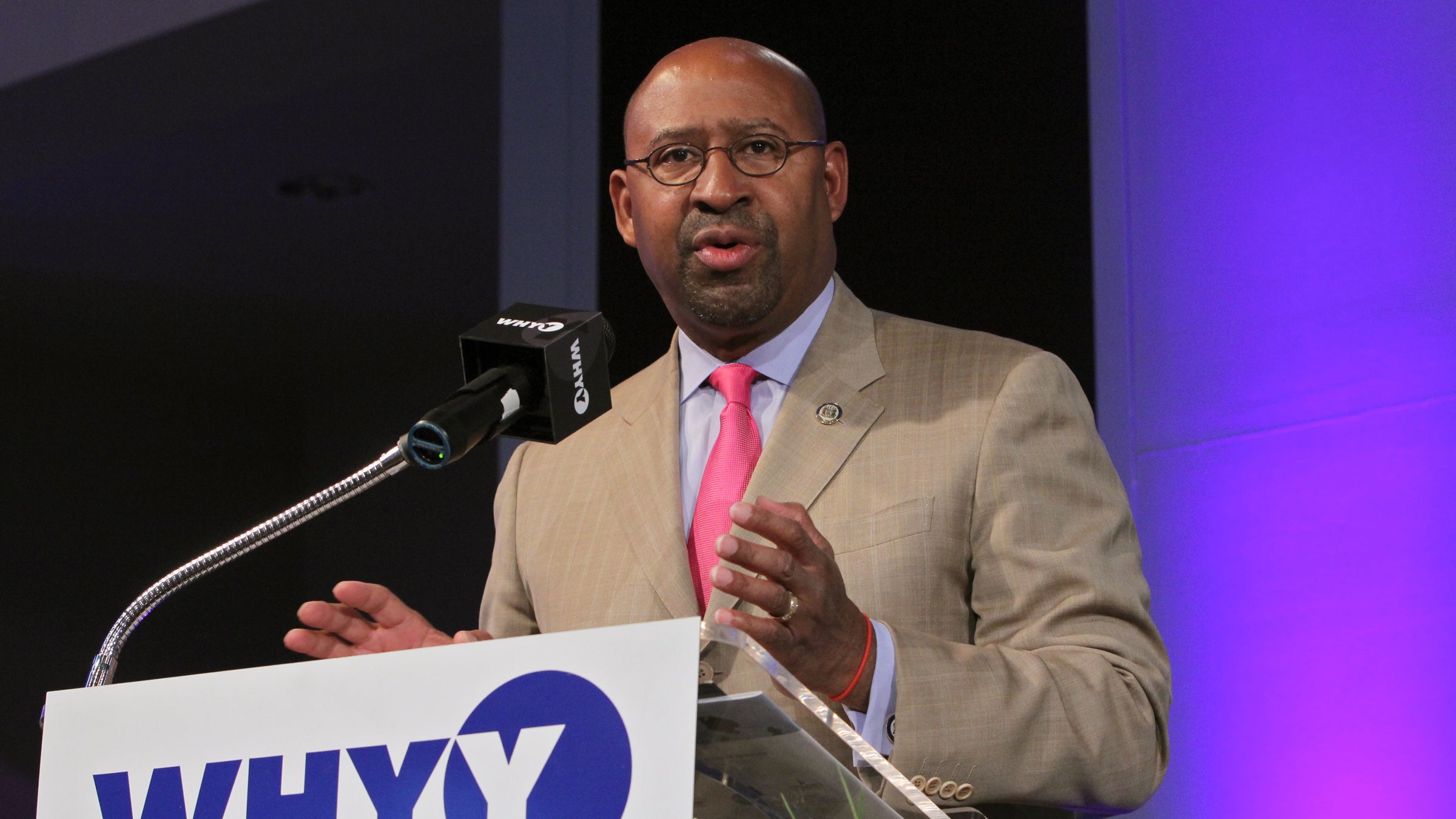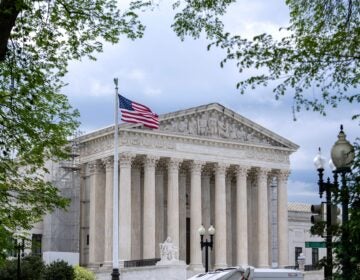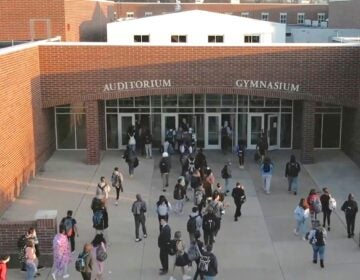Mayor Nutter calls for dissolution the School Reform Commission [updated]
Listen
Mayor Michael Nutter calls for the dissolution of the School Reform Commission by 2017. (Emma Lee/WHYY)
In a major education policy speech this morning, Mayor Nutter called for the dissolution of the School Reform Commission and the return of a local board of education.
“Of all the policy recommendations I make today, none will have a bigger impact on Philadelphia than a return to local control,” he told an audience of invited guests at WHYY.
After 15 years, Nutter said, “It’s time for the experiment to end.”
In addition to shifting power to a nine-member, mayorally appointed board, Nutter called for school advisory councils at every neighborhood school.
“While I believe that the SRC and its many members have functioned to the best of their abilities and with good intentions, we Philadelphians deserve to govern our own schools,” Nutter said. “A return to local control would give us real authority over the education of our children.”
He laid out a plan that would complete the transfer of power in September 2018. Conditions for the changeover would include “full funding for public education” by the state and a “student-weighted” education funding formula. This would allow the district, he said, to “adhere to its five-year financial-stability planning process that demonstrates the district’s structural balance.”
Then there would be a year of “public hearings on governance, debates, and forums on how best to improve education,” said Nutter. “Only then will we be in the right place to govern our schools locally.”
By 2017, he said, the district would put in place “new accountability practices” and begin the legal process for the transfer of power together with the governor, secretary of education, and the SRC. The changeover would occur the following September.
In Nutter’s vision, the new Board of Education, like the one the SRC displaced, would have nine members: five appointed outright by the mayor, four chosen from 12 recommended by City Council.
The SRC can only be dissolved if the members vote the commission out of existence or if the state legislature changes the law that created it.
In his speech, Nutter said that local school councils would promote the important function of helping school staffs get to know community members. They would be made up of parents, community members, teachers, administrators, and older students, would fundraise and volunteer, but also “help inform the decision-making process about after-school programs, class offerings and school staffing.
“The councils would benefit all schools, especially those schools with staff members who differ greatly from their students in terms of race, ethnicity, and income,” he said. “To succeed, the Councils need to be real instruments of change.”
The new district governing body would create a strategic plan to judge success of the councils, he said.
Education accomplishments
Despite facing a recession as soon as he took office and a political change in Harrisburg that resulted in the slashing of education spending, Nutter said there was real progress in education during his administration. Most prominent has been an increase in the high school graduation rate, especially for students who had been mostly written off before. For instance, the graduation rate for youth involved in the juvenile justice system more than doubled from 16 percent to 36 perent; for those in the foster care system, it rose from 28 percent to 44 percent.
Still, he said, “our current system is failing too many of our young people, leaving a generation of Philadelphians woefully unprepared for the 21st-century global economy … while I am proud of our progress, I know it isn’t enough. If you track an average ninth-grade class in our city, only one in 10 students will graduate college.”
Nutter reiterated his goal of having a “great school in every neighborhood,” a policy that is echoed by superintendent William Hite. And while he continued to profess an agnosticism on whether these should be charters or district-run schools, he took a shot at the funding structure that pits districts and charter schools against each other.
“Our most immediate problem is the district-charter school funding structure,” he said. Especially problematic is a special education funding system that sets different levels for district students depending on the severity of the disability, while the charter formula drives out one amount for charters. That amount is generally huge, while most charter special education students generally have relatively mild, less expensive disabilities.
He also called for charter schools to be held to higher accountability standards, pointing out that many lack transparency in sharing information about finances, governance and academics. About 10 percent don’t participate in the district’s system for evaluating school progress.
And he said that the current charter law that prohibits districts from setting enrollment caps on charter growth must be changed. Until a new funding formula takes into account the proportion of charter schools in a district — and until a charter reimbursement line item is restored to the state budget to help defray costs of new charters — districts should be able to control charter growth, he said.
“We need a clear plan and the authority to make sure that only the best performing charters are allowed to grow,” he said. Now, about 70,000 students attend more than 80 charter schools, about a third of the public school enrollment.
But Nutter also called for change in a teacher evaluation system in which hardly any teachers are ever rated unsatisfactory. He said that the teacher tenure system that awards tenure after three years of satisfactory service is “broken.”
And while he said he supported teachers, he said that the “contentious” relationship between the Philadelphia Federation of Teachers and the district has prevented a conversation about ways to “improve classroom performance,” instead concentrating on “contract disputes.”
Nutter said any new contract should be fair, but “within the financial constraints of the district,” and include members’ contribution to their health care, a point of contention.
After two years of stalemated contract talks, the SRC a year ago tried to unilaterally cancel the contract and impose terms. Since then, there have been no meaningful negotiations.
He said, however, that unless the district’s compensation package for teachers is competitive with surrounding districts as they gain more experience, “we can’t recruit or retain bright, enthusiastic teachers.”
He also called on the union to be more flexible on school staffing decisions.
“There has been some movement on this … but principals and site-selection committees should determine which teacher, regardless of seniority, has the skills needed to best serve that school’s students,” he said.
PFT staffer Hillary Linardopoulos said later that while she was encouraged by Nutter’s public call to abolish the SRC, which has been a PFT priority, she was troubled the mayor “portrayed the PFT as an obstacle to work around to make progress at some schools. Separating teachers from their union is a dangerous practice,” she said. “It’s an affront to the work educators do every day.”
SRC chairwoman Marjorie Neff said that she did not disagree with Nutter’s call to abolish the body that she leads. However, she worried that a governance discussion could divert attention from the major issue: attaining long-term funding stability for the district.
While Nutter set prerequisites, including a new education funding formula before delving into the governance change process, “I don’t want to get distracted from getting enough money to move the district forward.”
Democratic City Council candidate Helen Gym pointed out that a nonbinding referendum to abolish the SRC was overwhelmingly approved in the spring. “That issue has been clearly resolved by the public,” she said. “The bigger question and challenge that I still didn’t hear a good answer to is what is the district working towards, what is its vision for public education. That is my goal for Council, that we drive a bigger vision for what we can invest in.”
WHYY is your source for fact-based, in-depth journalism and information. As a nonprofit organization, we rely on financial support from readers like you. Please give today.





